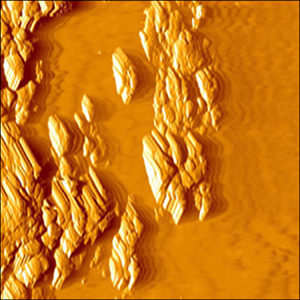Monday, January 8, 2007
Quote of the day
~Sen. Ron Wyden (D-Ore.)
Picture of the day
21x21um CaP crystals

Pacific Nanotechnology provides products and services that facilitate advances in nanoparticle technology and research. Our products are optimized for research, development, and process control applications when visualization, modification, and measurement of nanoparticle or nanopowder is critical.
To learn more about and to see more of these images, check out the following pages:
Pacific Nanotechnology Nanoparticle Image Gallery AFM images of nanoparticles, AFM data of nanopowders, AFM images of thermoplasitc elastomer, carbon nanotubes, polysterene particles, polymer particles, quantum dots, QD, latex spheres, drug powder, drug crystallines, polished quartz,blood cells, CNT, DNA, sol-gel, inclusions, triblock co-polymer, colloids, colloidal gold, colloidal gold spheres, carbon black, polypeptides, calcium phosphate, CaP, etc.
Pacific Nanotechnology Nanoparticle Technology
As with previous pictures, I will post the others in this series over time. To see it all now, visit the Nanotechnology Now Gallery.
The ethics of advanced technologies
The following is an abstract from their paper that introduces the symposium:
Nanoethics is a contentious field for several reasons. Some believe it should not be recognized as a proper area of study, because they believe that nanotechnology itself is not a true category but rather an amalgamation of other sciences, such as chemistry, physics and engineering. Critics also allege that nanoethics does not raise any new issues but rather revisits familiar ones such as privacy. This paper answers such criticisms and sets the context for the papers that follow in this nanoethics symposium.
Here is my reply to Patrick regarding the abstract:
Is your justification for the study of nanoethics that nanotechnologies will have such huge impact that they deserve study in their own rights? It seems to me that you could turn the critic’s complaint of "not a true category but rather an amalgamation of other sciences" around and say "it is precisely because nanotechnologies will broadly impact all these old-school categories that we need to study it."
And here is Patrick’s reply:
Actually, my justification for the pursuit of nanoethics is a three-pronged argument, in which what you mentioned might only be part of it. Basically:
(1) There's no reason for us to accept the litmus test that "in order for X to be a category/field in its own right, it must pick out unique issues not already covered elsewhere." Under this litmus test, we might have to collapse chemistry and biology into the single field of physics (which governs the interactions of all physical matter, including chemical elements and emergent biological processes), but that doesn't seem right. Also, if this litmus test were right, we could also perhaps argue that "bioethics" should not be recognized as a proper field of study, since its questions could be reduced to familiar ones in the pre-existing fields of privacy (patient rights), autonomy (right to die), theology (abortion), etc.
(2) Even if that were a good litmus test before, nanotechnology - and its ethics - seems to break the old rules insofar that nanotech itself is an amalgamation of other fields (unless you want to bite the bullet and argue that nanotechnology itself should not be recognized as a field of its own; but this seems to be a losing fight given the amount of money being poured into nanotech as its own area of research...nanotech already has a life of its own).
(3) Nanoethics does in fact raise unique issues not found elsewhere (e.g., the invisibility cloak, molecular manufacturing) or at least adds a significantly new dimension to related debates (e.g., privacy, economic justice).
Also, my argument above is more a semantic one and not so much a call to action. I'm not sure that many people would argue that we do not need to study the possible impacts of the set of technologies that make up "nanotechnology"; the need to worry about our future should be more or less clear already. Rather, their argument is more that we don't need to create a new field of study called "nanoethics" because those questions are already being investigated in bioethics, computer ethics, etc.
However, I would disagree with their argument: by neatly categorizing those questions under the umbrella of "nanoethics," we highlight the fact that nanotechnology is so far-reaching and will be directly responsible for profound changes to our world. Perhaps those who argue otherwise are trying to slip nanotechnology "under the radar" by not giving it or its ethics a name, i.e., "you don't need to worry about nanotech; it's really just a repackaging of familiar sciences and issues"…but I don't buy that - nanotech/ethics appears to be greater than the sum of its parts...
(*) For more information about the journal or its latest symposium on nanoethics, see www.pdcnet.org/ijap.html
For the introductory paper by The Nanoethics Group, see www.nanoethics.org/paper10807.html
To read the entire announcement, visit the Nanotechnology Now Press Release section www.nanotech-now.com/current-months-press.htm









